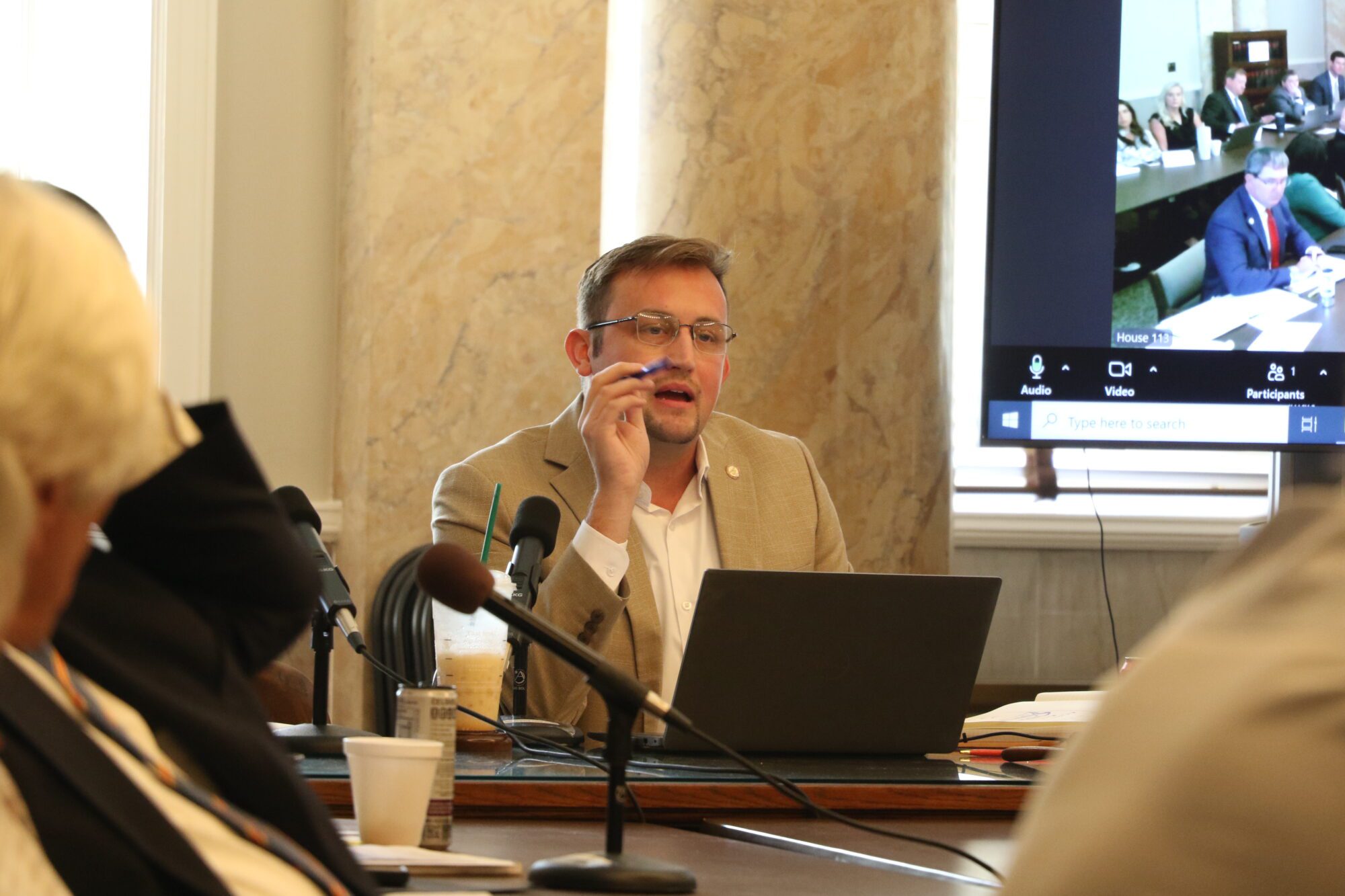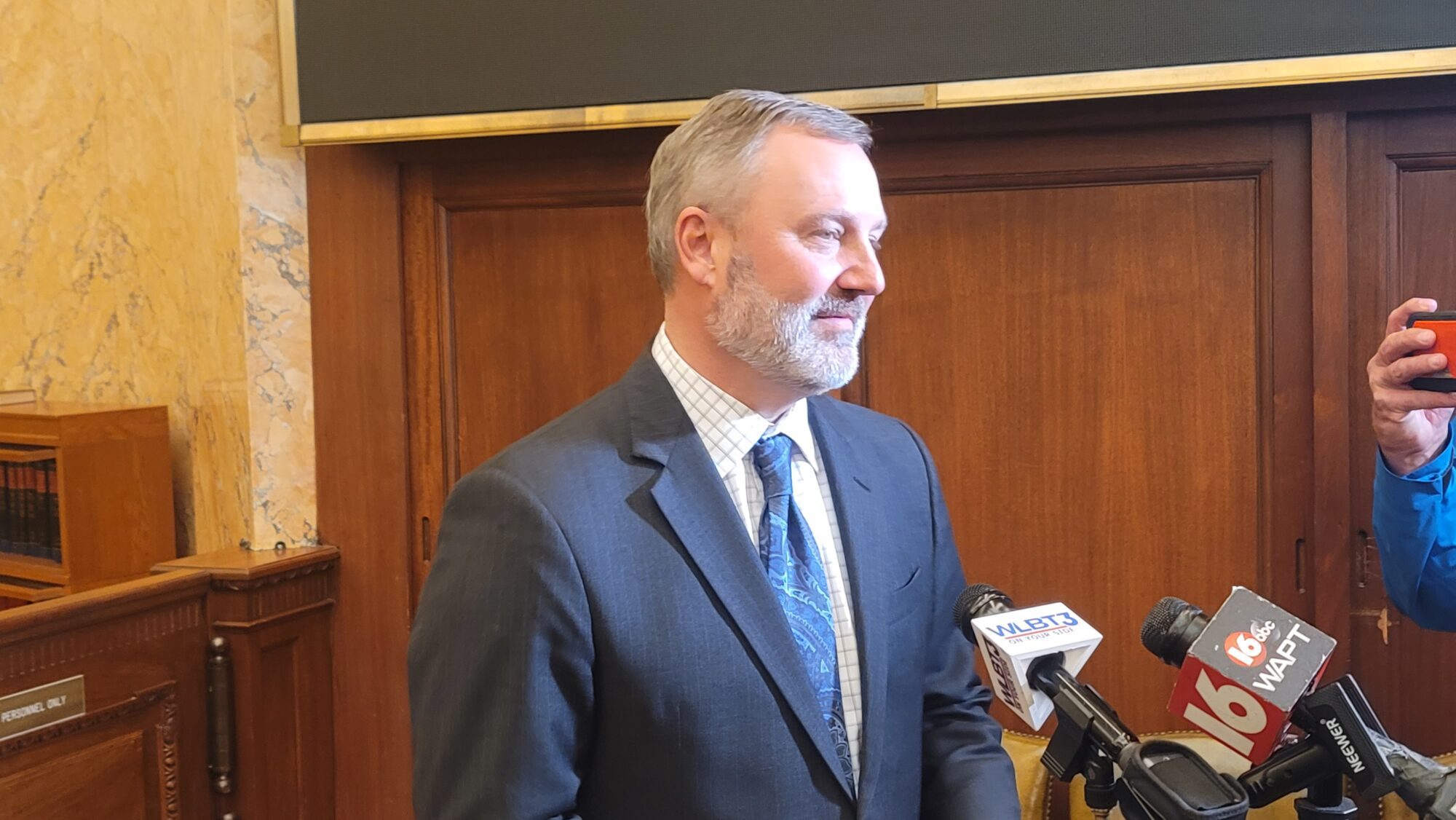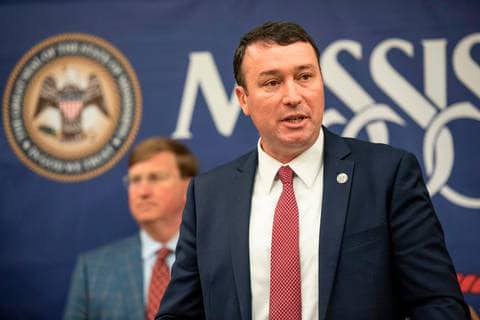
State Sen. Daniel Sparks speaks in the Chamber at the Mississippi Capitol in Jackson, Thursday, March 2, 2023. (AP Photo/Rogelio V. Solis)
- Senators look to create a Tier 5 in PERS for new hires while not reducing benefits from current retirees and employees.
The Mississippi Senate has voted to create a “hybrid” Tier 5 in the state’s retirement plan for newly hired employees, a move that was endorsed by the PERS Board at its December 2024 meeting.
Calls to adjust the Public Employees Retirement System (PERS) have mounted for years as the plan’s unfunded liabilities continue to climb, now over $26 billion.
Under SB 2439, authored by State Senator Daniel Sparks (R), no current retirees or state employees would be impacted, a point the senator made repeatedly during floor debate on Wednesday.
“This bill does not reduce any benefits including COLA, which is cost of living adjustment which some of your constituents call the 13th check,” Sparks said. “This does not reduce any benefits to any current retirees, beneficiaries, or employees. It actually puts more money into the PERS system to pay the unfunded actuarial liability and fulfill our obligation to the current retirees and beneficiaries.”
For the current state employees, their employee contribution rate will remain at 9 percent and the employer contribution rate will continue to rise to 19.9 percent over the coming years.
Sparks reminded his colleagues that actuaries had advised raising the employer rate to 25.92 percent. However, during the 2024 session, there was discussion of raising it to 22.4 percent, but the Legislature ultimately agreed to raise the rate a half percent each year until it reaches 19.9 percent after local governments voiced concerns.
As for the “hybrid” Tier 5 being created for new employees, it would go into effect on March 1, 2026. Sparks said it was referred to as a “hybrid” plan due to the fact that 4 percent of the 9 percent employee contribution would go to a defined benefit plan, which is what the other tiers in PERS are currently, while the other 5 percent would go to a defined contribution plan, such as a 401(a) plan, allowing for portability.
Sparks said under the defined benefit portion of the new Tier 5, a new hire would be vested after eight years. Average compensation would be calculated over the eight highest consecutive years, a change from a four-year high in the other tiers. Full retirement would be 62 years of age with 30 years of service or 65 years of age with eight years of service or at any age with 35 years of service. Four years of active-duty military service would count towards the years of credible state service.
In the new Tier 5, there would be no guaranteed cost of living adjustment, unless the Legislature approves for a specific year, meaning future hires would not receive a “13th check.”
In the defined contribution portion of the new Tier 5 plan, employees would be vested immediately, similar to a 401(k).
Senator Sparks called new tier’s impact PERS’ unfunded liability “significant” as it would potentially account for $140 million annually without an increase on state employers over the 19.9 percent contribution rate.
“As I calculate based on what the actuaries have put before us and what the PERS team as told me, we have over $7 billion a year in payroll for PERS employees,” Sparks said. “The changes that we’re making to Tier 5 will put $140 million new dollars annually toward the unfunded actuary liability.”
State Senator David Blount (D) said he views Tier 5 as “shifting the risk and the responsibility for the financial decisions for the rest of an employ’s lifetime from the state to the individual.”
Blount advocated for the state covering local government’s increased employer contribution rate before cutting taxes while also proposing new hires receive a 1 percent COLA under the bill.
“Upon retirement, the retiree is going to get $10,000 a year more under a defined benefit program with a 1 percent COLA than he or she will have under a defined benefit program with no COLA guaranteed, which is what is before you now,” Blount told senators, saying state employees would be much better off with a guaranteed 1 percent COLA.
Blount said lawmakers were asking teachers, county employees and other state employees to manage an investment portfolio and make investment decisions. He said the state is paying people at the retirement system to manage those funds now while ensuring the funds would be there when the employ retires under the full defined benefit program.
“I do not think that shifting the risk for a person’s retirement is what we ought to do,” Senator Blount said, adding that state employees often stay in lower paying jobs because of the guarantee of a defined benefit plan with an annual COLA.
Senator Sparks responded by saying actuaries have projected that in 2064, the legislation he’s proposing puts forward a plan that would be 96.6 percent funded, some 10.5 percent more than what Blount presented. Sparks also noted that no one filed a bill similar to what Blount spoke on Wednesday.
“The risk of a [defined benefit plan] is all absorbed by the plan’s sponsor, which is your state, your counties, your cities, your school districts. Our actuaries and our investment returns have been changed a lot over the years, lowered expectations, things like that. That’s what drives the rate up,” Sparks said, saying doing what the state has always done is getting “in a slower car to go over the same cliff.”
Another caveat included in the legislation was a change in wording related to PERS asking for more funds from the Legislature. Previously, the PERS Board was required to, or “shall,” bring two actuaries to the table when making requests. The legislation would change that to “may” in an effort to streamline the process.
Notably, the legislation would end the Supplemental Legislative Retirement Plan, otherwise known as SLRP, for future elected officials. Those who are in the system today would continue to enjoy the benefit. After March 1, 2026, elected officials coming into the Capitol would not receive the benefit.
“I get asked about this frequently by constituents,” Sparks said. “My response to them is generally I didn’t know it existed when I ran for this office but it really does seem to be a sore spot for our constituents so I think that it would be good just to put it to bed once and for all.”
Ultimately, the legislation passed 30 to 16 in the chamber. It will now be transmitted to the House for consideration.










